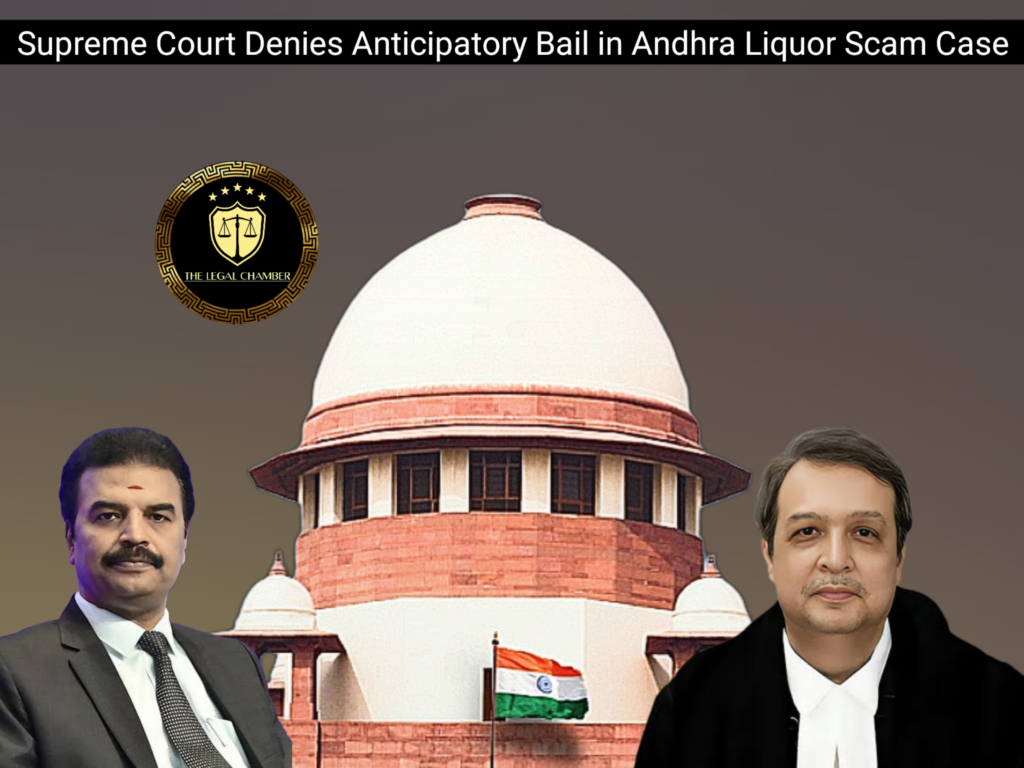
The Supreme Court upheld the denial of anticipatory bail, emphasizing that custodial interrogation is crucial in corruption cases involving influential accused. It clarified that confessional statements of co-accused under Section 161 CrPC cannot be considered at the bail stage, being inadmissible under Sections 25-26 of the Evidence Act. The Court reiterated that political vendetta allegations alone cannot justify anticipatory bail when prima facie evidence exists. It directed investigating agencies to avoid third-degree methods while preserving their right to seek custodial interrogation if warranted. The judgment reaffirmed the higher threshold for anticipatory bail compared to regular bail in serious economic offences.
Facts Of The Case:
The case arose from allegations of corruption in Andhra Pradesh’s liquor excise policy, where senior officials were accused of manipulating procurement processes to benefit select brands while suppressing established ones. The CID registered Crime No. 21/2024 under Sections 409, 420, 120-B IPC (corresponding BNS provisions) and Prevention of Corruption Act provisions, alleging ₹3,000 crore misappropriation. The prosecution claimed officials received ₹50-60 crore monthly kickbacks through a syndicate that diverted funds via gold traders and fake invoices. Market data showed drastic reductions (from 23.41% to 2.15%) in established brands’ market share between 2018-19 and 2023-24, while favoring new entrants. When the Andhra Pradesh High Court denied anticipatory bail to the accused – including retired bureaucrats – they approached the Supreme Court. They argued political vendetta, cooperation with investigations, and inadmissibility of co-accused statements. The State emphasized the need for custodial interrogation to uncover the money trail and broader conspiracy. The Supreme Court’s judgment analyzed evidentiary value of co-accused statements at bail stage while balancing investigative needs against potential misuse of power, ultimately dismissing the pleas but safeguarding against coercive interrogation methods.
Procedural History:
The case originated with the registration of Crime No. 21/2024 by Andhra Pradesh CID for alleged irregularities in the state’s liquor excise policy. The accused petitioners first approached the Andhra Pradesh High Court seeking anticipatory bail, which was denied through a common order dated May 7, 2025, in Criminal Petition Nos. 4837-38/2025. Subsequently, they filed Special Leave Petitions (Crl.) Nos. 7532-34/2025 before the Supreme Court, challenging the High Court’s order. During Supreme Court proceedings, the petitioners argued political vendetta and questioned the evidentiary value of co-accused statements, while the State emphasized the need for custodial interrogation to uncover the alleged ₹3,000 crore scam. The Supreme Court, in its judgment dated May 16, 2025, upheld the High Court’s decision but provided important clarifications regarding the evidentiary limitations of co-accused statements at the bail stage. The Court disposed of the petitions while safeguarding the accused against coercive interrogation methods and preserving their right to seek regular bail if arrested. One petitioner (SLP Crl. No. 7534/2025) who had already been arrested was granted liberty to approach the trial court for regular bail.
ALSO READ : Who Pays for Poor Students?:Supreme Court Stops Kerala’s Extra Fee on NRI Medical Students
Court Observation:
The Supreme Court made several critical observations while dismissing the anticipatory bail pleas. It emphasized that custodial interrogation remains indispensable in complex economic offenses involving influential accused, as it enables investigators to confront suspects with evidence and uncover hidden money trails. The Court clarified that statements of co-accused recorded under Section 161 CrPC cannot be considered at the bail stage, being inadmissible under Sections 25-26 of the Evidence Act, though such material may become relevant during trial under Section 30 if jointly tried. Importantly, the Bench observed that allegations of political vendetta alone cannot override prima facie evidence of wrongdoing, though it cautioned investigating agencies against using third-degree methods. The judgment distinguished between anticipatory and regular bail parameters, noting the higher threshold for pre-arrest relief in serious corruption cases. It also clarified that cooperation with investigation doesn’t automatically entitle accused to anticipatory bail when custodial interrogation is legitimately required to establish conspiracy patterns. The Court directed that if arrested, the petitioners could seek regular bail before competent courts based on merits.
Final Decision & Judgement:
The Supreme Court, in its final judgment dated May 16, 2025, dismissed the special leave petitions seeking anticipatory bail while delivering a nuanced verdict that balanced investigative imperatives with accused rights. The three-judge bench comprising Justices J.B. Pardiwala and R. Mahadevan upheld the Andhra Pradesh High Court’s denial of anticipatory bail, ruling that the gravity of allegations involving ₹3,000 crore in excise policy irregularities and the complex nature of the money trail justified custodial interrogation. However, the Court imposed strict safeguards against investigative overreach, prohibiting third-degree methods and preserving the petitioners’ right to seek regular bail if arrested. Significantly, the judgment clarified evidentiary limitations by holding that co-accused statements under Section 161 CrPC remain inadmissible at the bail stage under Sections 25-26 of the Evidence Act, though they may be considered during trial if jointly tried under Section 30. The Court disposed of all petitions while allowing one already-arrested petitioner to approach the trial court for regular bail, maintaining that anticipatory bail cannot be granted as a matter of routine in serious economic offenses involving high-ranking officials.
Case Details:
Case Title:P. Krishna Mohan Reddy & Ors. vs. The State of Andhra Pradesh Citation:2025 INSC 725 Criminal Appeal No.:Special Leave Petition (Crl.) Nos. 7532-7534 of 2025 Date of Judgment:May 16, 2025 Judges/Justice Name: Justice J.B. Pardiwala & Justice R. Mahadevan
Download The Judgement Here